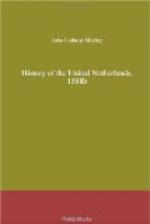The noble sailor, on whom so much responsibility rested, yet who was so trammelled and thwarted by the timid and parsimonious policy of Elizabeth and of Burghley, chafed and shook his chains like a captive. “Since England was England,” he exclaimed, “there was never such a stratagem and mask to deceive her as this treaty of peace. I pray God that we do not curse for this a long grey beard with a white head witless, that will make all the world think us heartless. You know whom I mean.” And it certainly was not difficult to understand the allusion to the pondering Lord-Treasurer.” ‘Opus est aliquo Daedalo,’ to direct us out of the maze,” said that much puzzled statesman; but he hardly seemed to be making himself wings with which to lift England and himself out of the labyrinth. The ships were good ships, but there was intolerable delay in getting a sufficient number of them as ready for action as was the spirit of their commanders.
“Our ships do show like gallants here,” said Winter; “it would do a man’s heart good to behold them. Would to God the Prince of Parma were on the seas with all his forces, and we in sight of them. You should hear that we would make his enterprise very unpleasant to him.”
And Howard, too, was delighted not only with his own little flag-ship the Ark-Royal—“the odd ship of the world for all conditions,”—but with all of his fleet that could be mustered. Although wonders were reported, by every arrival from the south, of the coming Armada, the Lord-Admiral was not appalled. He was perhaps rather imprudent in the defiance he flung to the enemy. “Let me have the four great ships and twenty hoys, with but twenty men a-piece, and each with but two iron pieces, and her Majesty shall have a good account of the Spanish forces; and I will make the King wish his galleys home again. Few as we are, if his forces be not hundreds, we will make good sport with them.”
But those four great ships of her Majesty, so much longed for by Howard, were not forthcoming. He complained that the Queen was “keeping them to protect Chatham Church withal, when they should be serving their turn abroad.” The Spanish fleet was already reported as numbering from 210 sail, with 36,000 men,’ to 400 or 500 ships, and 80,000 soldiers and mariners; and yet Drake was not ready with his squadron. “The fault is not in him,” said Howard, “but I pray God her Majesty do not repent her slack dealing. We must all lie together, for we shall be stirred very shortly with heave ho! I fear ere long her Majesty will be sorry she hath believed some so much as she hath done.”
Howard had got to sea, and was cruising all the stormy month of March in the Channel with his little unprepared squadron; expecting at any moment —such was the profound darkness which, enveloped the world at that day— that the sails of the Armada might appear in the offing. He made a visit to the Dutch coast, and was delighted with the enthusiasm with which he was received. Five thousand people a day came on board his ships, full of congratulation and delight; and he informed the Queen that she was not more assured of the Isle of Sheppey than of Walcheren.




